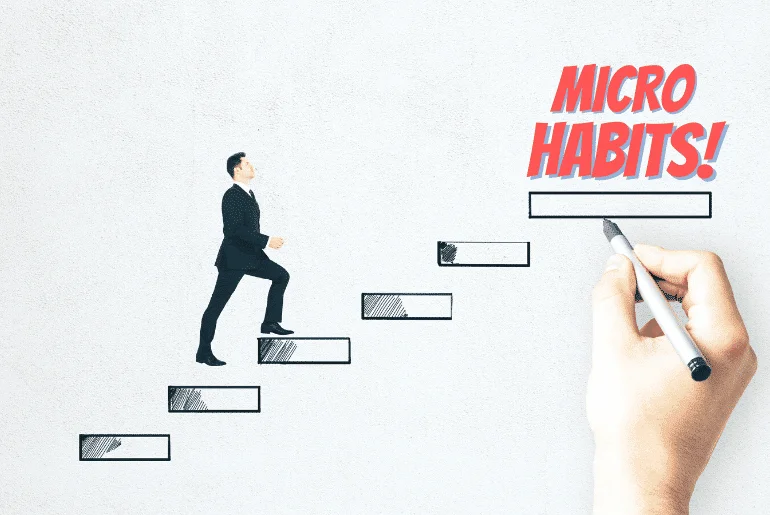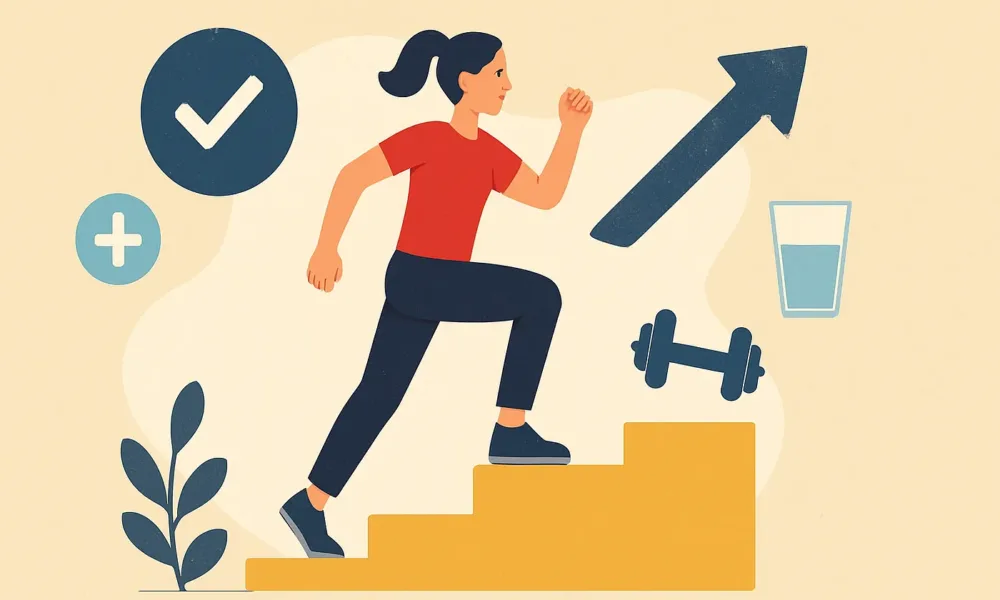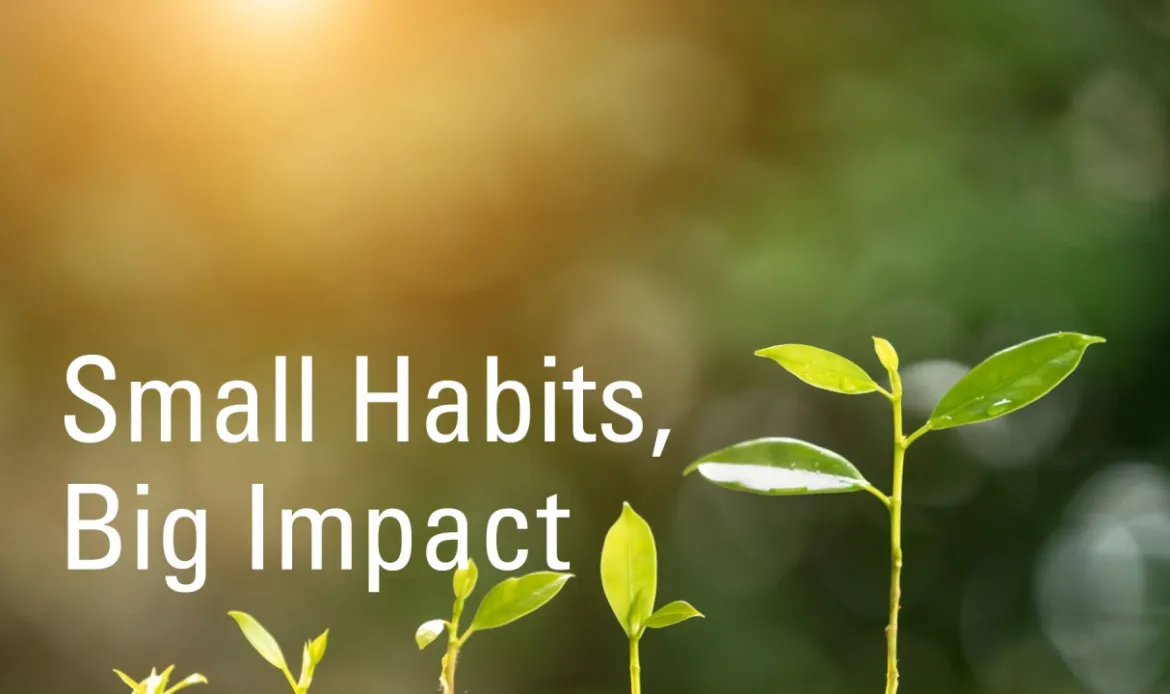Micro-Habits for Busy People: Small Changes That Create Big Results
We live in an age that glorifies the hustle. From entrepreneurs to working parents, everyone seems to be racing against time, juggling deadlines, social commitments, and self-imposed expectations. In the chaos of “do more,” we often forget the simplest truth — consistency beats intensity.
We live in an age that glorifies the hustle. From entrepreneurs to working parents, everyone seems to be racing against time, juggling deadlines, social commitments, and self-imposed expectations. In the chaos of “do more,” we often forget the simplest truth — consistency beats intensity.
The modern solution to a busy life isn’t to work harder; it’s to work smarter — and micro-habits are the ultimate tool to help you do that.
Micro-habits are tiny, easily repeatable actions that take little time but, when done consistently, lead to lasting transformation. They’re not overwhelming like massive lifestyle changes. Instead, they slip effortlessly into your daily routine, slowly rewiring your brain for better habits, productivity, and happiness.
Imagine this:
- Writing one sentence a day turns into finishing a book.
- Doing five pushups daily turns into a consistent fitness routine.
- Saying “thank you” once each morning builds a mindset of gratitude.
It’s not about dramatic overnight change — it’s about gentle, sustainable growth. Let’s explore how you can use the science and simplicity of micro-habits to transform your life, no matter how busy you are.
Table of contents
- 1. The Science Behind Micro-Habits
- 2. Why Micro-Habits Work for Busy People
- 3. The Compound Effect of Small Wins
- 4. Designing Your Micro-Habits
- 5. Micro-Habits That Can Change Your Day
- 6. How to Keep Micro-Habits From Fading
- 7. Breaking Bad Habits with Micro-Actions
- 8. Micro-Habits for Mindfulness
- 9. Micro-Habits for Physical Health
- 10. Micro-Habits for Mental Clarity
- 11. Micro-Habits for Relationships
- 12. When You Miss a Day — Start Again, Not Over
- 13. The Emotional Ripple Effect of Micro-Habits
- 14. Building Momentum: From Micro to Macro
- 15. The Golden Rules of Micro-Habit Success
- 16. Real-Life Examples of Micro-Habit Transformation
- 17. From Busy to Balanced: The Power of Less
- 18. Start Today: Your Micro-Habit Challenge
- Conclusion: Small Steps, Lasting Change
1. The Science Behind Micro-Habits
Human behavior is driven by patterns. The brain prefers routines because they save energy. According to research on neuroplasticity, the more we repeat an action, the stronger the neural pathway becomes — until it becomes automatic.
Micro-habits take advantage of this neurological truth. Because they’re so small and simple, the brain doesn’t resist them. Unlike drastic goals (“I’ll start working out two hours a day!”), micro-habits eliminate mental resistance by focusing on actions so easy they’re impossible to refuse.
BJ Fogg, a behavioral scientist at Stanford University, calls this the “Tiny Habits Method.” His advice? Start small — really small. For instance:
- Instead of flossing all your teeth, start with one.
- Instead of meditating for 20 minutes, take three deep breaths.
- Instead of running a marathon, put on your running shoes.
The key is to make the habit too easy to fail. Once it’s a natural part of your identity, you can build on it gradually.
2. Why Micro-Habits Work for Busy People
If you’re constantly on the go, large commitments often backfire. They require significant time, energy, and mental bandwidth — things that are already scarce in a busy lifestyle.
Micro-habits, on the other hand:
- Fit effortlessly into your day. You don’t need an hour — just 30 seconds.
- Build momentum. Small wins create a sense of achievement, encouraging consistency.
- Reduce guilt and stress. You stop feeling like you’ve “failed” because you’re doing something every day.
- Rewire your self-image. As James Clear, author of Atomic Habits, says, “Every action you take is a vote for the type of person you wish to become.”
It’s about progress, not perfection.
3. The Compound Effect of Small Wins
Think of micro-habits as compound interest for your life. The small things you do daily add up — quietly, consistently, powerfully.
If you improve by just 1% each day, you’ll be 37 times better in a year. That’s the magic of compounding. Tiny improvements, when repeated consistently, lead to exponential growth.
Examples:
- Drinking one more glass of water daily → better hydration → improved focus and skin health.
- Reading one page a day → 365 pages → roughly 10–12 books a year.
- Writing down one thing you’re grateful for each night → a calmer, more positive mindset.
Over time, these actions transform your habits, your mindset, and ultimately, your life.
4. Designing Your Micro-Habits
Creating micro-habits isn’t just about choosing random small tasks — it’s about designing habits that align with your goals and identity. Follow these four steps:
Step 1: Anchor Your Habit
Attach your new habit to something you already do.
- Example: “After I brush my teeth, I’ll drink a glass of water.”
- “After I open my laptop, I’ll take three deep breaths.”
These “anchors” use existing routines as triggers, making your new habit automatic.
Step 2: Start Ridiculously Small
If it feels too easy, you’re doing it right.
- Want to start journaling? Write just one sentence.
- Want to stretch more? Do it for 30 seconds.
The goal is to make it effortless so your brain doesn’t resist it.
Step 3: Celebrate Small Wins
Smile, clap, say “Yes!” — reward your brain with a burst of dopamine. Celebrating small wins cements the habit emotionally.
Step 4: Build Gradually
Once a habit feels natural, you can expand it. That one pushup can become five, then ten. The micro-step becomes a foundation for macro-success.
5. Micro-Habits That Can Change Your Day
Here are some powerful micro-habits categorized by areas of life — all of them take under five minutes but can dramatically improve your well-being, productivity, and mindset.
A. Morning Micro-Habits
- Make your bed. It’s your first win of the day — a sign of order and discipline.
- Drink water before coffee. It rehydrates your body and boosts alertness.
- Take 3 deep breaths. Reduces stress and centers your mind.
- Say one positive affirmation. Example: “Today, I will handle everything with calm and confidence.”
- Open the blinds. Sunlight tells your brain it’s time to wake up, improving energy and mood.
B. Workday Micro-Habits
- Check your top three priorities every morning. Keeps your focus on what truly matters.
- Stretch every hour. Prevents stiffness and boosts circulation.
- Use the 2-minute rule. If a task takes less than 2 minutes, do it immediately.
- Stand up during calls. Enhances posture and energy.
- Close all extra tabs. A clutter-free screen supports a clutter-free mind.
C. Emotional Wellness Micro-Habits
- Write one gratitude note a day. Gratitude rewires your brain for Positivity.
- Replace one complaint with a compliment. This instantly uplifts your energy.
- Practice mindful pauses. Before reacting, take one deep breath.
- Journal one sentence about your mood. Acknowledging emotions builds self-awareness.
- Smile intentionally once an hour. Even fake smiles release feel-good endorphins.
D. Evening Micro-Habits
- Reflect on one thing that went well. Trains your brain to see progress.
- Prepare tomorrow’s outfit. Reduces morning stress.
- Put your phone away 15 minutes before bed. Improves sleep quality.
- Dim the lights. Signals your body that it’s time to rest.
- Read one page of a book. Ends your day on a calm note.
6. How to Keep Micro-Habits From Fading
Starting small is easy — staying consistent is the challenge. Here are proven methods to make your micro-habits last:

1. Habit Stacking
Attach your habit to a daily event:
“I will stretch after I brush my teeth.”
“I will journal after dinner.”
The more specific the connection, the stronger the habit.
2. Visual Cues
Use reminders.
- Keep a journal next to your bed.
- Place your vitamins beside your toothbrush.
- Keep a water bottle on your desk.
Visual cues nudge your brain to act.
3. Accountability
Tell a friend or join a community. Sharing your micro-habit journey builds motivation and commitment.
4. Track Progress
Use a habit tracker app or a simple notebook. Checking off your habits daily provides visual satisfaction and boosts consistency.
5. Focus on Identity
Instead of saying “I’m trying to exercise,” say “I’m someone who moves daily.”
Identity-based habits are more powerful because they redefine who you believe you are.
7. Breaking Bad Habits with Micro-Actions
Micro-habits aren’t only for creating new routines — they’re just as powerful for breaking harmful ones.
Instead of quitting a bad habit abruptly, replace it with a micro-action that aligns with your goals.
Examples:
- Want to stop scrolling before bed? Replace it with one minute of deep breathing.
- Want to quit smoking? Replace the urge with sipping water or chewing gum.
- Want to eat healthier? Start by adding one vegetable to your plate, not cutting out everything at once.
The key is substitution, not deprivation. Over time, the brain learns to seek the positive replacement instead of the harmful behavior.
mindfulness“>8. Micro-Habits for Mindfulness
Busy people often struggle with staying present. Micro-habits of mindfulness can ground you in the moment, even in a packed schedule.
Try these:
- 30-second breathing breaks between meetings.
- Feel your feet touch the ground whenever you stand.
- Name one thing you can see, hear, and feel to anchor yourself in the present.
- Smile before opening your email. It shifts your mindset from stress to gratitude.
- End your day with a mini reflection: “What moment made me smile today?”
These tiny acts of mindfulness calm your nervous system, reduce anxiety, and make you more aware and compassionate.
9. Micro-Habits for Physical Health
Even the busiest schedule can make room for health — you just need micro-steps.
- Do 10 squats before your shower. Builds strength without the gym.
- Take stairs instead of elevators once a day. Increases your daily movement.
- Stretch your neck and shoulders every hour. Eases tension from sitting.
- Drink one extra glass of water per meal. Boosts metabolism and hydration.
- Eat one fruit daily. Simplifies nutrition.
Physical wellness doesn’t require dramatic diets or gym memberships. It starts with micro-decisions repeated consistently.
10. Micro-Habits for Mental Clarity
A cluttered mind is a tired mind. Simplify your thoughts through small daily actions:
- Write your to-do list the night before. Reduces morning stress.
- Declutter one item on your desk daily. Creates a clean mental space.
- Set a one-minute timer for mindful breathing. Resets focus.
- Say “no” once a week to something non-essential. Protects your energy.
- Journal your top learning of the day. Converts experiences into wisdom.
Mental clarity isn’t about having fewer tasks — it’s about managing attention wisely.
11. Micro-Habits for Relationships
Busy lives often leave little time for nurturing relationships, but tiny habits can keep your connections strong.
- Send one kind text a day. A simple “thinking of you” goes a long way.
- Listen without interrupting for 60 seconds. Builds empathy.
- Say “thank you” more often. Appreciation deepens bonds.
- Give one genuine compliment daily. Spreads positivity.
- Put your phone down during conversations. Presence is the best gift.
Small, consistent gestures create meaningful, lasting relationships.
12. When You Miss a Day — Start Again, Not Over
Even the best-intentioned people slip up. You’ll miss a day. Maybe even a week. But here’s the secret — missing once doesn’t matter if you start again immediately.
Consistency isn’t about perfection; it’s about persistence.
James Clear puts it beautifully: “Never miss twice.” If you fall off track, the best response is to restart without guilt. Every micro-habit is a vote toward the life you want — one vote missed doesn’t cancel the election.
13. The Emotional Ripple Effect of Micro-Habits
Beyond productivity, micro-habits shape your emotions. They teach patience, discipline, and self-trust.
When you accomplish small things daily, you send your brain a message: “I can rely on myself.”
That belief builds confidence, reduces stress, and improves your sense of control in a chaotic world.
A single deep breath before reacting can prevent an argument.
A single “thank you” can brighten someone’s day.
A single page can spark a lifelong learning habit.
These moments may seem insignificant, but they ripple outward, transforming not only your own mood but also the energy you bring to others.
14. Building Momentum: From Micro to Macro
Once you master micro-habits, expansion becomes natural. The same mindset that helps you take small steps will eventually help you take giant leaps.
For example:
- One minute of meditation becomes ten.
- One pushup becomes a full workout.
- One gratitude note becomes a daily journal practice.
Micro-habits create identity shifts — and once your identity changes, bigger habits follow effortlessly. You no longer “try” to live better; you are someone who does.
15. The Golden Rules of Micro-Habit Success
To keep your momentum strong, remember these principles:

- Start easy. If it feels hard, shrink it.
- Stay consistent. Frequency beats intensity.
- Be patient. Results compound slowly but powerfully.
- Track progress visually. Seeing your streak motivates you.
- Pair habits with joy. Attach positive emotion to every repetition.
- Forgive failure. Perfection is not the goal; growth is.
16. Real-Life Examples of Micro-Habit Transformation
- Sarah, a marketing executive, began each morning by writing one line in her gratitude journal. Within six months, her stress levels dropped, and her coworkers noticed her newfound positivity.
- David, a father of two, started doing five pushups daily. Two years later, he runs marathons — all because he built the identity of “someone who moves daily.”
- Priya, a software developer, decided to read one paragraph of a personal growth book each night. Today, she’s read over 40 books and started a blog on personal development.
Their lives didn’t change overnight. They changed in micro-steps that accumulated into macro-results.
17. From Busy to Balanced: The Power of Less
Busy people often equate doing more with being successful. But micro-habits remind us that less is often more.
It’s not about squeezing in another hour of work — it’s about aligning your actions with your values. It’s not about overhauling your life — it’s about quietly upgrading your days.
Micro-habits teach us that transformation isn’t loud. It’s subtle, quiet, and deeply personal.
When you focus on doing one small thing well every day, life stops feeling overwhelming — and starts feeling meaningful.
18. Start Today: Your Micro-Habit Challenge
Here’s your 7-day starter plan — perfect for anyone who feels “too busy to start.”
Day 1: Drink one extra glass of water.
Day 2: Write one sentence of gratitude.
Day 3: Take three deep breaths before opening your phone in the morning.
Day 4: Compliment one person genuinely.
Day 5: Read one page of a book.
Day 6: Declutter one item from your workspace.
Day 7: Reflect for 60 seconds before bed on what went well this week.
Repeat these micro-actions. Watch how your energy, focus, and positivity begin to shift — effortlessly.
Conclusion: Small Steps, Lasting Change
Big success doesn’t come from grand gestures. It comes from quiet, consistent micro-actions repeated over time.
Micro-habits are proof that transformation doesn’t require massive effort — just intentional repetition. They fit into any schedule, empower any lifestyle, and create ripples of growth that expand beyond measure.
So, start today. Take one small step — drink that glass of water, write that single line, take that mindful breath.
Because every small act is a seed of self-mastery, and every seed — when nurtured — grows into something extraordinary.
The secret is simple: Small steps. Every day. Big change. Always.
The Positivity Collective
The Positivity Collective is a dedicated group of curators and seekers committed to the art of evidence-based optimism. We believe that perspective is a skill, and our mission is to filter through the noise to bring you the most empowering wisdom for a vibrant life. While we are not clinical professionals, we are lifelong students of human growth, devoted to building this sanctuary for the world.
